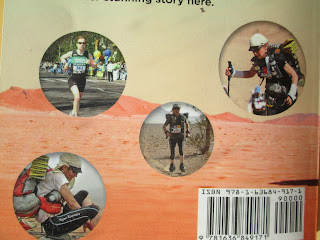When Fiona Oakes decided to run competitively,
no coach wanted to take her on. She had no money to buy magazines about running,
no time to spend on blogs. With over 400 animals under her care, she relied on
her determination, strong work ethic and discipline to compete. She did not
have a coach to support her goals, but she did have a purpose that compelled
her to do her best.
The lack of a knee cap never deterred her from
running either.
Fiona
Oakes has competed and won in several places, including the North Pole,
Antarctica and the Sahara Desert. “Running for Good” is a book I could not put
down. I was spellbound by Fiona’s adventures of running marathons under extreme
conditions; her humility and compassion are at the heart of every experience.
“It hasn’t been easy. I’ve got no coach, nobody to tell me what to do or what not to do. I have to truly believe that whatever effort I’m putting in on any given day, there is going to be a reward for it on race day. I’m short of time; it’s horrible weather, and I’m tired, but I’ve got to believe that by going and doing that run, that training, it is going to make a difference on that race day, somewhere in the future. That belief has been one of my greatest strengths, and underlying that belief is the motivation that allows me to do it all. I am not doing it for myself. I don’t want anything for myself that badly that would drive me that hard and make me that determined.”
Fiona Oakes saves lives in different settings:
as a firefighter, as a caregiver in her animal sanctuary, and even as a runner,
at the marathons, when she has the chance to support her competitors in need.
Fiona Oakes is vegan, and she runs to stand
up for her beliefs. She competes to bring attention to the brutality of factory
farms, places where animals are exploited and tortured from the day they are
born to the day they die. Everything is connected, so it makes sense to point
out that the cruelty of factory farms has domino effects on human animals too,
and this is a good time to highlight a relevant fact that the mainstream media
ignore: Factory farms are breeding grounds for new pandemics. (Feel free to
check the articles at the bottom of this post to learn more).
The first
time the BBC contacted Fiona Oakes for an interview, after she won a competition
in the North Pole, they made a special request: they asked her to avoid mentioning
that she was vegan. Why would they want to censor that about her? However,
when she was asked what compelled her to run, she had the chance to state her purpose and she emphasized her
veganism. The reporter ignored her comment.
Overlooking the central aspect of her running
is no longer feasible, because it has always been the driving force of her
career.
Fiona
does not run to celebrate awards and medals. She does it for the sake of
others.
“I sometimes feel embarrassed when I say that
what drives me on is the suffering of animals in the factory farming industries
and the cruelty that’s going on in the world today. For example, take the
Marathon des Sables: It is a tough race, it’s a brutal race. Indescribably hot.
It never goes below 50 degrees. You’ve got sandstorms, you’ve got a marathon to
do a day, one day you’ve got an 80 K, you’ve got jebels to climb, you’ve got sand
to deal with. You’ve got all sorts of problems, but I say I feel embarrassed
because the caveat to all this is that at any point I can put my hand up and
say, ‘Actually, I’ve had enough and I want to go home now.’ You can. The
animals can’t, so what I’m doing is just a drop in the ocean, and because I’m
doing it for a purpose, failing is a disaster for me. It’s not something that
I’ve got written in my agenda that I’m going to fail.”
Unlike other runners, Fiona does not have much
time to recover. She needs to look after the animals in the sanctuary that she
founded: the Tower Hill Stables Animal Sanctuary. The sanctuary is her
priority. Running is secondary.
“Every penny we’ve got has always gone into
the sanctuary,” she says.
I hope her own words will help to explain the
authenticity of her love and humility, and to illuminate the darkest corners of
this world:
“People ask what sort of animals
we take in. Let me tell you, people don’t ask you to take in young, healthy,
fit, well-trained dogs. And people don’t come to you and say, ‘I’m really
looking for something elderly, something on expensive medication, and
preferably we’d like it to be incontinent.”
Her connection with the animals has always been deep. She has a special understanding of them. I hope that she will write a book about her relationships and experiences with the animals at the sanctuary. I will be happy to read it and will write about it on this blog.
Thank
you so much for everything you do, Fiona. You are an inspiration to many
people, and those who support you are also an inspiration. Keep up the ripples
of love and hope.
Happy New
Year.
To learn more about her Sanctuary and how you
can help, visit the Sanctuary site.
https://www.towerhillstables.org/founder
You can
learn more about Fiona Oakes from this interview:
https://www.plantstrongpodcast.com/blog/fiona-oakes
Articles
about how factory farms are breeding grounds for future pandemics:
https://ffacoalition.org/factory-farming-pandemics/
https://www.latimes.com/opinion/story/2020-11-30/minks-covid-pandemic-factory-farms
https://earthfirstjournal.news/2022/02/01/prosecutors-silence-evidence-of-cruel-factory-farm-practices-in-animal-rights-cases/
This is an
insightful conversation about this.



